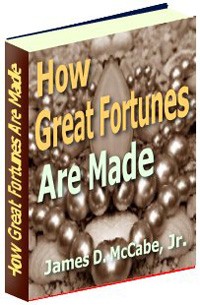 License Type: Private Label Rights
License Type: Private Label Rights  File Size: 1,926 KB
File Size: 1,926 KB File Type: ZIP
File Type: ZIP
 SKU: 26967
SKU: 26967  Shipping: Online Download
Shipping: Online Download
Ebook Sample Content Preview:
Those who imagine that the mercantile profession is incapable of developing the element of greatness in the mind of man, find a perfect refutation in the career of the subject of this memoir, who won his immense fortune by the same traits which would have raised him to eminence as a statesman. It may be thought by some that he has no claim to a place in the list of famous Americans, since he was not only German by birth, but German in character to his latest day; but it must be borne in mind that America was the theater of his exploits, and that he owed the greater part of his success to the wise and beneficent institutions of the “New Land,” as he termed it. In his own country he would have had no opportunity for the display of his great abilities, and it was only by placing himself in the midst of institutions favorable to progress that he was enabled to make use of his talents. It is for this reason, therefore, that we may justly claim him as one of the most celebrated of American merchants.
John Jacob Astor was born in the village of Waldorf, near Heidelberg, in the Grand Duchy of Baden, on the 17th of July, 1763. This year was famous for the conclusion of the Treaties of Paris and Hubertsburg, which placed all the fur-yielding regions of America, from the Gulf of Mexico to the Frozen Sea, in the hands of England. He was the youngest of four sons, and was born of Protestant parents. He was early taught to read Luther’s Bible and the Prayer-book, and throughout his whole life remained a zealous Protestant. He was trained to the habit of rising early, and giving the first of his waking hours to reading the Bible and Prayer-book. This habit he continued all through life, and he often declared that it was to him the source of unfailing pleasure and comfort. His religious impressions were mainly due to his mother, who was a pious, thrifty, and hard-working woman, given to saving, and devoted to her family.
His father, on the contrary, was a jolly “ne’er do well,” a butcher by trade, and not overburdened with industry. The business of a butcher in so small a village as Waldorf, where meat was a luxury to the inhabitants, was merely a nominal calling. It knew but one season of real profit. It was at that time the custom in Germany for every farmer to set apart a calf, pig, or bullock, and fatten it against harvest time. As that season approached, the village butcher passed from house to house to slaughter the animal, cure its flesh, or make sausage meat of it, spending, sometimes, several days at each house. This season brought Jacob Astor an abundance of work, and enabled him to provide liberally for the simple wants of his family; but during the rest of the year it was with difficulty that he could make bread for them. Yet Jacob took his hard lot cheerfully. He was merry over his misfortunes, and sought to forget them in the society of companions who gathered at the village beer-house. His wife’s remonstrances against such a course of life were sometimes so energetic that the house became any thing but a pleasant place for the children.
Here John Jacob grew up to boyhood. His brothers left home to earn their livelihood elsewhere, as soon as they were old enough to do so, and he alone remained under the paternal roof. His father destined him for his own calling, but the boy shrank from it with disgust. To crown his misfortunes, his mother died, and his father married again, and this time a woman who looked with no favor upon the son. The newly-married pair quarreled continually, and the boy was glad to escape occasionally to the house of a schoolmate, where he passed the night in a garret or outhouse. By daylight he was back at his father’s slaughter-house, to assist in carrying out the meat. He was poorly clad and badly fed, and his father’s bad reputation wounded him so keenly that he shrank from playing with other boys, and led a life of comparative isolation.
- File Size:1,926 KB
- License: Private Label Rights
- Category:Ebooks
- Tags:2009 Ebooks Private Label Rights








